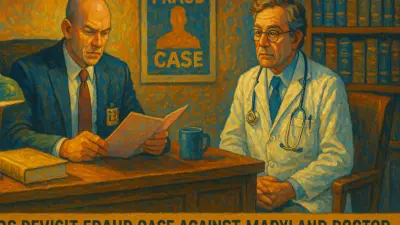TThe U.S. Court of Appeals for the Fourth Circuit has overturned the acquittal of Dr. Ron Elfenbein, ordering a new trial on charges that he submitted inflated Medicare claims for COVID-19 testing services at his urgent care clinic in Anne Arundel County.

Elfenbein, who operated Drs. ERgent Care in Gambrills and surrounding areas faced allegations that his clinic systematically upcoded patient visits, billing for more complex services than were rendered, to generate higher reimbursements during the height of the pandemic.
A federal jury in Baltimore initially found him guilty, but a district judge acquitted him, describing the billing guidelines as having been ambiguously applied.
The Fourth Circuit’s three-judge panel disagreed, finding that sufficient evidence existed for a jury to conclude Elfenbein deliberately misrepresented his services in a published opinion.
Judge Julius Richardson wrote that the jury could correctly interpret medical records and billing codes to support charges of fraud, reports the Maryland Daily Record.
While the court acknowledged that the most compelling evidence emerged from Elfenbein’s testimony, it emphasized the necessity of deferring to the jury’s judgment unless “no rational trier of fact could have convicted.”
The appellate court affirmed the district court’s provision for a new trial, signaling the complexity of the evidence and the ongoing need for judicial clarity. Fourth Circuit Appeals.
Prosecutors accused Elfenbein of submitting false medical records alongside upcoded claims, portraying brief COVID-19 testing visits as more intensive encounters.
Elfenbein countered that his coding followed the American Medical Association’s CPT Manual standards. He also received support from the AMA and the Maryland State Medical Society, which jointly filed a brief suggesting that physicians should be free to exercise their judgment when coding services.
Healthcare fraud carries serious consequences, including substantial fines and potential prison time. The appellate court’s decision resets the case, sending it back to the district level for retrial, which will revisit detailed billing arguments and procedural standards governing Medicare reimbursement.
The new trial could reshape accountability in pandemic-era billing practices and may influence how courts assess disputed medical coding decisions.
It also highlights tension between regulatory oversight and professional discretion, particularly in emergency healthcare settings.







